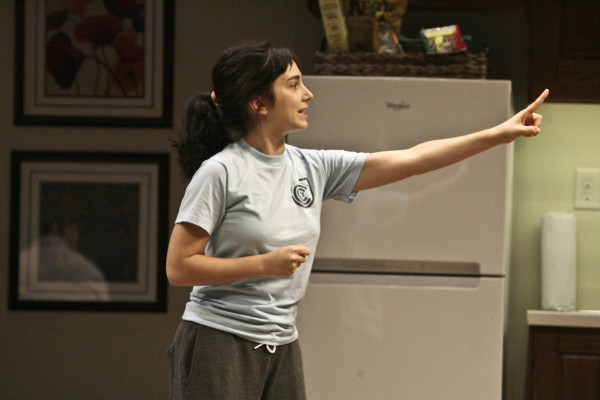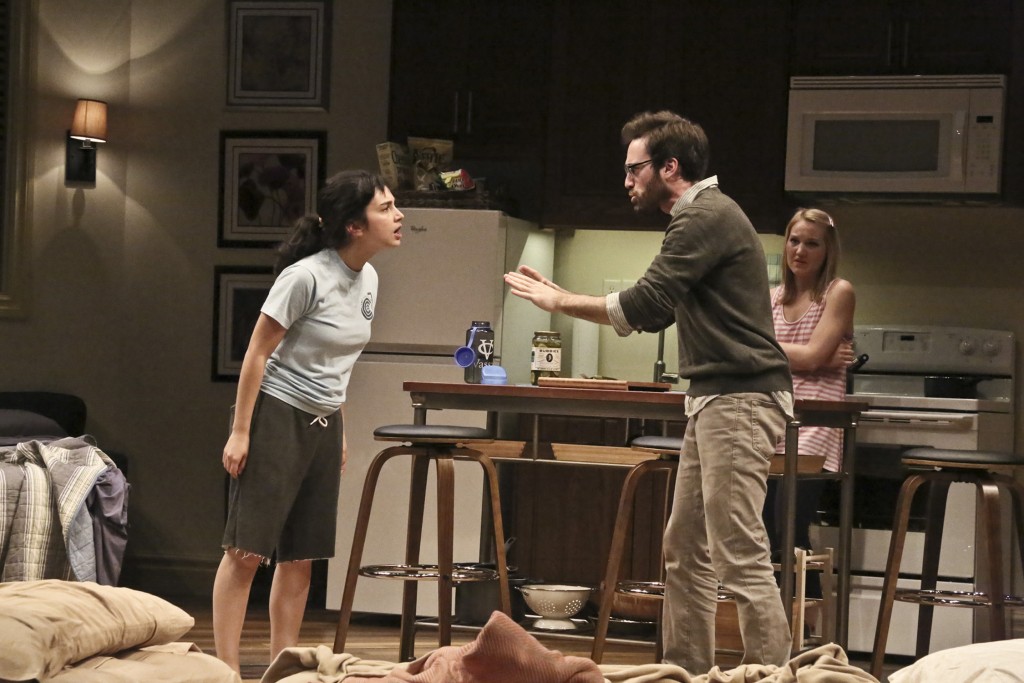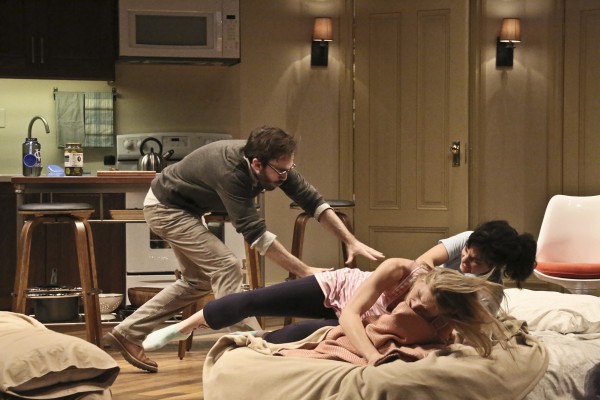There was plenty of laughter at the opening night of Bad Jews at The Geffen Playhouse last week. A kind of willful determination to have a cracking good time. The guffaws kept coming, fueled, as they so often are on opening nights, by family, colleagues, friends and, in this case, a tribe.
I belong to none of the groups above, except for the Jewish tribe. Author, directors, actors et al call Bad Jews a comedy. So why was I not laughing?
The short answer is: because it’s… complicated. So is the longer answer.
A Jewish grandfather and holocaust survivor living in New York has died. The funeral has just taken place and for the occasion granddaughter Daphna Feygenbaum (Molly Ephraim) is sharing a studio apartment in Manhattan with her cousin Jonah Haber (Raviv Ullman). They’re waiting for Jonah’s older and brainier brother Liam (Ari Brand) to arrive with his non-Jewish girlfriend Melody (Lili Fuller). Daphna is churning about the fact that Liam missed the funeral entirely. She’s also churning about having to share this tiny studio not only with Jonah but also Liam and the shiksa.
That’s the first sign of trouble.

Daphna has issues the way other people have shoes. She also has an unruly mop of dark hair. Her parents, unlike the Habers, are not wealthy, which is irritation enough. Not only is Daphna a super-dedicated Jew (which Liam and Jonah are not), but she also is a 21st Century Jewish princess who can sustain an entire monologue, seemingly on one breath, longer than anyone. The more vituperative, the better. She doesn’t talk, she lectures. And the first thing she lectures Jonah about is not understanding why his parents felt they had to buy an entire one-room studio for their boys to use when they’re mostly away at college. Don’t those parents already live in a grand apartment on the very same floor overlooking the Hudson? What’s wrong with the living room couch?
To say that Daphna is easily outraged is to say that the sun rises each morning. To say she makes everyone else’s business her own is to say that sun sets every night. To get a word in edgewise is to attempt Mount Everest. This woman is the Olympian champion of the Jewish filibuster.
When we first meet her she’s just warming up, in training for something she needs to get off her chest and into her grabby hands. It is deceased grandpa Poppy’s gold Chai — a Jewish symbol of life, usually worn around the neck by the men in the family, and usually passed down to a direct male descendant. This particular Chai has enhanced importance because Poppy managed to hang on to it all the time that he was in the Nazi death camps by keeping it under his tongue. In Daphna’s world, that makes it the ne plus ultra of precious possessions.
And that’s the second sign of trouble.
Daphna has rationalized that the Chai should be hers by divine right of being the prima superJew of the family. She wants it so badly that when Liam finally shows up — this “bad Jew” who wants to marry the blue-eyed pale white Melody with the slick blonde hair — Daphna is ready for him in full battle gear. And the battle that ensues is of biblical proportions.
That’s the plot. Petty family infighting and flimsy sitcom stuff, aggravated by the indefatigable Daphna’s interminable harangues. Funny harangues, to be sure, but oh, so wearing. How this play received mostly raves when it played at the usual points east — as far east as New York and London — is a bit of a mystery. It’s as if a play had finally come along that told audiences it was now OK to laugh at the Jews without walking on eggs.

But that was never the problem. The problem is that the play can’t decide what it’s really about. The characters are not without interest, except for Jonah, who keeps saying he wants out of the whole situation — and is mostly kept out of it by fiat of playwright Joshua Harmon, who has barely sketched him in.
And, no, as usual the actors do not disappoint. Ephraim is a verbal marathoner, stuck with questionably entertaining nonstop talk and that Jewish semi-Afro that opens the door to a hilarious put-down of all that hair by Liam, who can’t stand it. He may become her principal opponent in this battle royal, but he also is her intractable equal in the haranguing department. There’s no doubt they belong in the same family.
In the thankless role of the pallid Melody, Lili Fuller gives us an aspiring opera singer who totally cannot sing (which makes for the second funniest scene in the play) and manages to survive in a part that has few other distinguishing characteristics to hold on to. One has to side with Daphna when she wonders out loud (she does everything out loud) what it is that Liam sees in this woman. Director Matt Shakman keeps the momentum going and the energy never flags (except when Melody sings — and sings, and sings — but that’s intentional).
Ultimately, the real issue is that Harmon, for whom this play was a first big hit, started out to write one play and, midstream, turned left and wrote another. What begins as a comedy morphs halfway through, pivoting on to deeper subjects. That’s confusing. Audiences continue to laugh at what happens, but it’s not so funny any more. The ending is decidedly unfunny and all of the characters, Daphna included, are jolted into a new reality that looks to alter the course of at least some of their lives.

Ironically, this serious twist uncovers a side of Harmon’s playwriting skills that is a lot more interesting. What started out as a piece designed to make us laugh with cheap jokes, mostly at the expense of the unbearable Daphna, becomes a potential wake-up call — for us and for her. It also may cost Liam his romance with Melody, who suddenly wakes up to what life might be like were she to marry into a family that includes both a Liam and a Daphna.
In the end, it also reveals Daphna as an insecure woman of infinite fantasies about herself (including references to a phantom Israeli soldier she claims as a fiancé). This Jewish princess has no clothes… and in her nakedness perhaps finally becomes aware of her desperate and often cruel machinations. (We — and she — should be so lucky.) Can she become a better person, Chai or no Chai? Who knows…
The ending feels weak and expedient, out of step with the rest of the script. Yet given all that has gone before, it hardly matters. It does, however, tell us something important: that Harmon is a more complex writer than this play allows. What to think about all this is something you’ll have to decide for yourself.
The set by John Arnone and costumes by E.B. Brooks serve the play well. So does Elizabeth Harper’s lighting. The sound by Jonathan Snipes is… the sound, good in spots, spotty in others. It certainly could be better.
So what exactly is this play? Dramatic comedy or comic drama? And does it matter what we call it? Not really. What matters is that it’s a play unsure of its identity, perhaps because Harmon was still quite a new writer when he created it. But it’s the very imperfections of this script that point to his considerable human understanding, not to mention the verbal agility he commands in giving birth to someone as vivid and impossible as Daphna. This guy has a future. He also has another play, Significant Other, that opened in New York last Thursday to reviews that would seem to confirm this prognosis.
Bad Jews might just be a rocky start to a sky-rocketing career.
Top image: l-r, Raviv Ullman, Molly Ephraim, Ari Brand & Lili Fullerin Bad Jews at The Geffen Playhouse.
Photos by Michael Lamont.
WHAT: Bad Jews
WHERE: Gil Cates Theatre at The Geffen Playhouse, 10886 Le Conte Avenue, Los Angeles, CA 90024.
WHEN: Tuesdays-Fridays, 8pm; Saturdays 3 & 8pm; Sundays, 2 & 8pm. Ends July 19.
HOW: Tickets $39-$79 (prices subject to change) available by phone at 310.208.5454, online at www.geffenplayhouse.org or in person at the Geffen box-office.
